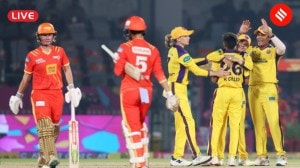Courting trouble
It's extraordinary, the extent the BJP government will go to court trouble. Sunday's notifications relocating all the cases of corruption...

It8217;s extraordinary, the extent the BJP government will go to court trouble. Sunday8217;s notifications relocating all the cases of corruption in Tamil Nadu, currently being dealt with by the Special Courts designated for the purpose, to various sessions courts in Chennai have come to symbolise yet again the rank arrogance and self-serving opportunism of those in power. This lot presumes that having the people8217;s mandate to govern automatically gives them the licence to trample over established norms and procedures with impunity. That this is being done in an area as sacrosanct as the law, makes it all the more worthy of condemnation.
The reason for such importunate behaviour is a familiar one, so familiar in fact that reiterating it only makes for repetition. Appeasing the Goddess in Chennai has become almost second nature to the country8217;s rulers, that they are forced, every once in a while, to defend the indefensible and justify the unjustifiable. The people haven8217;t forgotten the marching orders that wereissued last August to the then head of the Enforcement Directorate, M.K. Bezbaruah, whose agency was investigating cases against Jayalalitha. On that occasion Jayalalitha herself was a picture of righteous indignation, even demanding a CBI probe into the transfer. Within three weeks of the order, the Supreme Court found fault with the move, forcing the government to revoke the order much to its embarrassment. The coming weeks could well witness a replay of this scenario. In the present case, the Special Courts were in the process of hearing 46 cases of corruption brought against Jayalalitha, with charges having been framed in two and chargesheets filed in another 19. Transferring them to the sessions courts could mean not just dislocation and wasted effort but an indefinite postponement of their final outcome.
The government says that it has acted within the ambit of the Prevention of Corruption Act, 1988, and points out that this Act empowers only the Centre, not state governments, to set up special courtsto try corruption charges. It further argues that the Tamil Nadu Special Courts Bill, 1997, under which the special courts were set up, was passed expressly to foist false cases on Jayalalitha. But the fact is that the Supreme Court is already seized of the matter and the appointment of the special judges, which was incidentally upheld by the Madras High Court, is to come up before it within a few days. Therefore this haste to settle the matter in favour of Jayalalitha and company seems unseemly and motivated in the extreme. Already, an entire platoon of legal luminaries have condemned the government notifications as 8220;mala fide8221; and 8220;bad in law8221; and, in Chennai, two of the three special judges have rejected the move. As one of them put it, the notifications have no legal sanction and are not worth the paper they are written on. The political scene is uncertain as it is, and the latest development with its suggestion of a trade-off between the BJP and its southern partner, will only conspire to make thescene even murkier.
- 01
- 02
- 03
- 04
- 05































